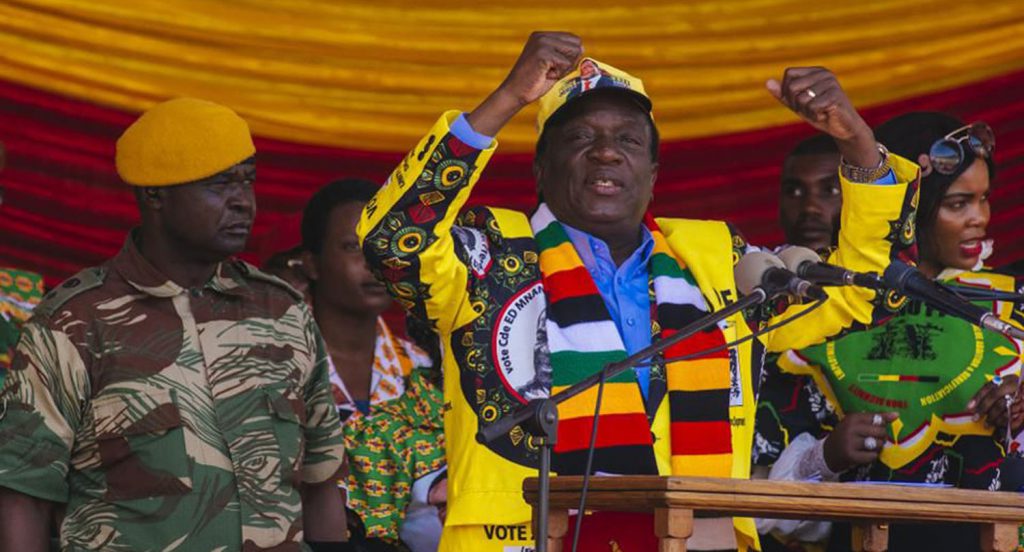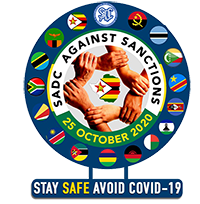The Zimbabwe Anti-Sanctions Forum here reproduces excerpts of a talk at African Liberation Day Public Forum, Accra Polytechnic in May 2008 by Nigerian writer and political philosopher Chinweizu on Africa’s duty to help Zimbabwe fight illegal Western sanctions on the country. The Southern African Development Community, by declaring October 25, 2019 a Solidarity Day with Zimbabwe in the fight against sanctions, has answered Chinweizu’s call to arms.
***
I am here to remind us all of our Pan-Africanist duty to stand in solidarity with the people of Zimbabwe in their present trials and tribulations.
May I remind you of Pan-Africanism’s Black Solidarity Principle that, in Nyerere’s words, “as long as black people anywhere continue to be oppressed on the grounds of their colour, black people everywhere must stand together in opposition to that oppression”.
In Zimbabwe for the last eight years, the black population has been under severe attack by the imperialist white power enemies of black Africa, namely the UK, the USA and the EU.
The people of Zimbabwe need our Pan-African help and solidarity against an economic war inflicted on them through sanctions allegedly targeted at only their leaders.
Sanctions have crippled the Zimbabwean economy.
Markets for Zimbabwean exports are closed because blacks now own the land stolen by Rhodesian colonisers.
Foreign tourism has also plummeted, costing tens of millions of dollars a year in lost revenue.
A sizeable part of the population has been forced to seek economic refuge abroad.
This is all happening according to the white power plan.
We should recall that former US Assistant Secretary of State on African Affairs, Chester Crocker said in a 2005 testimony to the US Senate for the Zimbabwe Democracy Act (ie sanctions and regime change legislation):
“To separate the Zimbabwean people from ZANU-PF we are going to have to make their economy scream, and I hope you senators have the stomach for what you have to do.”
And that is precisely what is happening.
The economy is indeed screaming, by enemy design.
The enemy intended to so torture the Zimbabwean people that they would reject Zanu-PF at the polls.
Of course, enemy propaganda claims that the collapse of the Zimbabwean economy is simply the result of land reforms and mismanagement by the Zanu-PF regime.
My friends, if you believe that you can believe anything.
You can even believe that all the weapons of mass destruction in the world are stockpiled in Saddam Hussein’s shoes!
So we come to the question: Why are the white powers torturing the black people of Zimbabwe?
They call Zimbabwe an “outpost of tyranny” and claim they want to remove Zanu-PF from power and bring to the Zimbabweans the pleasures and benefits of democracy.
But that is a bloody big lie.
In actual fact, they want to reverse the land reforms of the last 10 years, and engineer a situation where the whites, at less than one percent of the population can go back to owning more than 70 percent of the arable land, including most of the best land.
That is why they are, through sanctions, which is an act of economic warfare, torturing the black people of Zimbabwe.
But how did whites ever come to own land in Zimbabwe, and so much land at that?
The answer lies in what happened during the so-called Scramble for Africa in the closing decades of the 19th century.
Following the notorious Berlin Conference of 1884-85, the European powers set out on their scramble to conquer and seize the lands of black Africans.
In 1889 Cecil Rhodes’ British South Africa Company (BSAC) gained a British mandate to colonise what would become Southern Rhodesia.
In 1890 – a pioneer column of white settlers arrived from South Africa at the site of the future capital Harare, and started grabbing land.
The black owners of the land opposed the white land stealers. But by 1893 the Ndebele uprising against BSAC rule was crushed.
But that statement does not convey how it was done.
For a flavour of the genocidal war and sustained terrorism the British inflicted on the blacks who resisted their land grab, consider the case of the Amandebele (Matabele) of what became Southern Rhodesia (now Zimbabwe.
By the trickery of treaties and the terrors of war, the Amandabele were dispossessed of their land, stripped of their cattle, reduced to the status of bondsmen, scattered, barred from moving about from place to place except under a system of permit or pass, and made to do forced labour on the farms and mines of whites.
The net result, as reported at the time:
“The net position is this: The native population of Southern Rhodesia possesses today no rights in land or water.
“It is allowed to continue to live upon the land on sufferance and under certain conditions… There appears to be no attempt on anyone’s part to deny the bedrock fact that these 700 000 natives have been turned from owners of land into precarious tenants.” (ED Morel, “The Black Man’s Burden”.)
And among the methods employed in the race war and terror campaign that achieved this?
In the words of the Matabele Times, “We have been doing it up to now, burning kraals because they were native kraals, and firing upon fleeing natives simply because they were black.”
And for a glimpse of the spirit in which the British troops waged that race war, consider these words by an adventurer friend of Cecil Rhodes, a certain WA Jarvis: “The best thing to do is to wipe them all out as far as one can – everything black.”
And in letters to his mother, Jarvis wrote: “I hope the natives will be pretty well exterminated. …
“There are 5 500 niggers in this district (Gwelo, now Gweru) and our plan of campaign will probably be to proceed against this lot and wipe them out then move on towards Bulawayo wiping out every nigger and every kraal we find. …
“And after these cold blooded murders, you may be sure there will be no quarter and everything black will have to die, for our men’s blood is fairly up.”
At the end of it all, the Amandabele view of what the British had done to them was this:
“Our country is gone, our cattle have gone, our people are scattered, we have nothing to live for, our women are deserting us; the white man does as he likes with them; we are the slaves of the white man, we are nobody and have no rights or laws of any kind.” (ED Morel, “The Black Man’s Burden”.)
This armed and genocidal seizure of the land of the blacks would be compounded and given a fig leaf of legality when, in 1930 the colonial government passed the Land Apportionment Act, which divided the colony into separate areas for whites and blacks.
The act allocated to white settlers, who numbered only about 50 000 (less than five percent of the colony’s population), approximately 50 percent of the land.
Leaving the other 50 percent to the 95 percent of the population that was black.
Now, as we all know, it was not until 1980, after a 15-year guerrilla war against the white settler government of Ian Smith, that the stage was set for the blacks to recover their land after almost a century of white usurpation.
The setting for that was the Lancaster House agreement of December 1979.
The three-month long conference almost failed to reach conclusion, due to disagreements on land reform.
Zimbabwe was pressured to sign and land was the key stumbling block.
Both British and American governments of the day offered to buy land from willing white settlers who could not accept reconciliation (the “willing-buyer, willing-seller” principle – which could not be changed for ten years) and a fund was established, to operate for ten years from 1980 to 1990.
The British assisted in setting up the Zimbabwe Conference on Reconstruction and Development in 1981.
At that conference, more than £630 million of aid was pledged.
The first phase of land reform in the 1980s, which was partially funded by the United Kingdom, successfully resettled only 71 000 families out of a target of 162,000.
What, after that, became of the Lancaster House provisions on land and the pledges?
Having secured the non-expulsion of the defeated white settlers, Britain proceeded to renege on its commitment to fund the repurchase of the land it had stolen a century earlier.
By its own admission in 2004, “Since independence we have provided 44 million pounds for land reform in Zimbabwe.”
That’s £44m out of the £630m pledged in 1981.
The Zimbabwean Ministry of Foreign Affairs has noted that it was estimated that about US$2 billion would be needed to properly support land reforms in the country.
The government said it received only £40m between 1980 and 1996, and that, though a mission – sent by John Major to evaluate the position after the £40m provided under Mrs Margaret Thatcher had been exhausted – recommended that further funding be given to Zimbabwe to complete the land reform programme, when John Major lost the 1997 general election to Tony Blair, the new regime immediately repudiated all the undertakings made by the British under the Lancaster House Agreement to assist Zimbabwe with land reforms.
It quotes a letter written to the Zimbabwean government on November 5, 1997 by Ms Clare Short, the then newly-appointed Secretary of State for International Development, which reads in part:
“I should make it clear that we do not accept that Britain has a special responsibility to meet the costs of land purchase in Zimbabwe.
“We are a new government from diverse backgrounds without links to former colonial interests.
“My own origins are Irish and, as you know, we were colonised not colonisers.”
Given this clearly-worded reneging by the British government on its Lancaster House commitments, the Zimbabwean government felt it was left with no option but to legally designate for acquisition in 1997 “nearly 1 500 white-owned farms for resettlement to landless peasants”.
That was how the Zimbabwean crisis was launched.
Because Zimbabwe, when faced with Britain’s perfidious reneging on the Lancaster House Agreement, dared to try to repossess the stolen lands by any means necessary, Britain, supported by the white powers, launched a campaign of regime change, using sanctions and all the other familiar devices in the imperialist bag of tricks.
They have demonised the Zimbabwean leadership, crippled the economy with sanctions, organised and paid for an opposition called the MDC.
It is a script we have seen before in other parts of the world including Chile, Haiti, Nicaragua and Venezuela.
The result is the ongoing torture of the Zimbabwean people.
And where do the allegations of human right violations, and lack of democracy come in?
That is all part of the regime change scenario.
Given their decision to drive Zanu-PF from power for daring to take back the land stolen by whites, these are all ways of giving a dog a bad name in order to hang it.
It’s all part of the faked story to justify regime change.
It’s like the famous weapons of mass destruction that the world was assured that Saddam had stockpiled!
But we must not be fooled.
We must not forget that Zanu-PF has stayed long in office by being elected and re-elected each time.
Now, is it for the imperialists, or for the Zimbabwean electorate to decide when Zanu-PF should stop ruling?
And all this noise about elections not being free and fair?
When was the last time any elections were held in Saudi Arabia, let alone free and fair elections?
Yet nobody is organising regime change there!!
When was the last “free and fair” election in Nigeria or Kenya for that matter?
Yet nobody is organising regime change in these countries.
Why not?
Precisely because they hand over to the imperialists even what the imperialist have not dreamt of asking to be given.
The point of it all is that, if a regime defends the interests of its people, it will earn the enmity of the imperialists, and become a target for these accusations and sanctions.
But if it serves imperialism, it can be as undemocratic as Saudi Arabia, as suppressive of human rights as the Obasanjo regime was in Nigeria, or Pinochet’s in Chile, and the imperialists will give it their seal of approval.
What is the role of the MDC in all this? The MDC are simply regime change tools of the imperialists. They belong with black traitors like Dhlakama of Renamo and Savimbi of Unita.
Not only have they been lavishly funded by the imperialists, but Rhodesian whites have openly supported MDC and come to Zimbabwe saying they will be taking “their” farms from indigenous Zimbabweans when MDC rules.
Make no mistake about it.
What Zanu-PF has been doing since 1997 is to collect reparations by any means necessary, after having patiently given the imperialists every opportunity to abide by their own pledges to fund their own “willing-seller, willing-buyer” formula for land redistribution.
For carrying the liberation struggle to its second stage, Zanu-PF deserves the support of all anti-imperialist black Africans, of all Pan-Africanists.
We mustn’t forget that when white-ruled Rhodesia was under sanctions in the 1960s and 1970s, it was helped to bust sanctions and survive by white-ruled South Africa and white ruled Mozambique.
Now that black Zimbabwe is under punitive sanctions from the vengeful white world powers, why are black-ruled South Africa and its other SADC neighbors not doing enough to help Zimbabwe defeat these sanctions?
What is black Africa doing to help? We must all do much more!
We will not have done enough until these sanctions are defeated with our visible help.
So I must ask each and every one of you: what are you, in Pan-Africanist solidarity, prepared to do to help the Zimbabwean people today?
Having said all that, it is our comradely duty to also ask Zanu-PF to thoroughly review its methods of fighting sanctions and its methods of telling its story to its people and to the world.
For it seems not to have done an adequate job of that so far.





